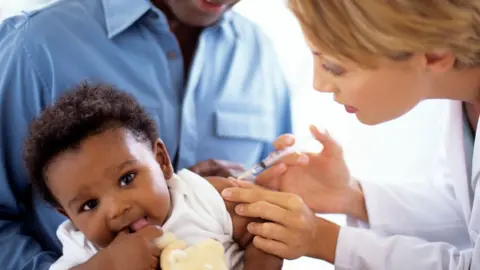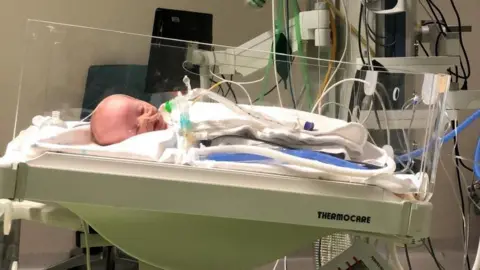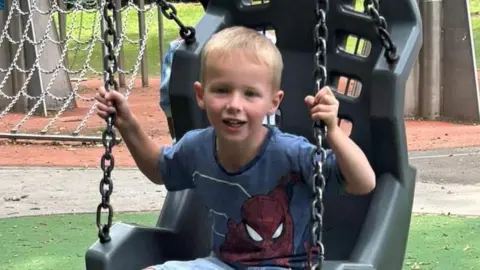RSV: Winter virus jab rolled out for babies and elderly

 Getty Images
Getty ImagesA vaccination programme to protect newborn babies and older people against respiratory syncytial virus (RSV) is being rolled out in England, Wales and Northern Ireland on Monday, following a similar scheme in Scotland.
RSV is one of the common viruses that causes coughs and colds in winter, but it can cause severe and sometimes life-threatening breathing difficulties.
For the first time, women who are at least 28 weeks’ pregnant and elderly people aged 75 to 79 will be offered the vaccine.
Scotland began its RSV vaccination programme last month.
Andrew Gwynne, England’s minister for public health, launched the new jabs and said: “This is preventable, which is why this vaccine is so important.”
His grandson Lyle, now five, recovered after two weeks in intensive care with RSV as a baby.
Mr Gwynne said he did not want anyone to go through the worry that he and his family faced.
 Andrew Gwynne
Andrew GwynneIt is estimated that 20,000 babies are hospitalised in England each year with illnesses linked to RSV, and up to 30 die as a result.
Some 90% of children catch the virus before the age of two, and it is a leading cause of chest problems, such as bronchiolitis, in babies.
The virus also affects elderly people and contributes to 9,000 admissions for pneumonia each year, according to experts.
 Andrew Gwynne
Andrew GwynnePaediatrician Yasmin Baki, who works at UCLH in London, said they see 500 patients each winter with RSV.
“It’s potentially life-threatening, particularly for very young, vulnerable babies who may have other conditions, like cardiac conditions, or may be premature. Those babies tend to get very sick.”
She urged pregnant women to get vaccinated and said the vaccine could be a game-changer this winter.
“It could change what we see at the front door of A&E here, in terms of vulnerable young babies.”
NHS England says research from the thousands of pregnant women worldwide who have been vaccinated against RSV shows that the jab reduces the risk of severe lung infection by about 70% for their babies in the first six months of life.
A recent study in the Lancet suggested the vaccination programme could prevent 5,000 hospitalisations and 15,000 A&E attendances for infants, and 2,500 hospital admissions for older people this winter, which NHS England said could also reduce pressures for front-line staff.
The vaccine is called abrysvo and is made by Pfizer.










